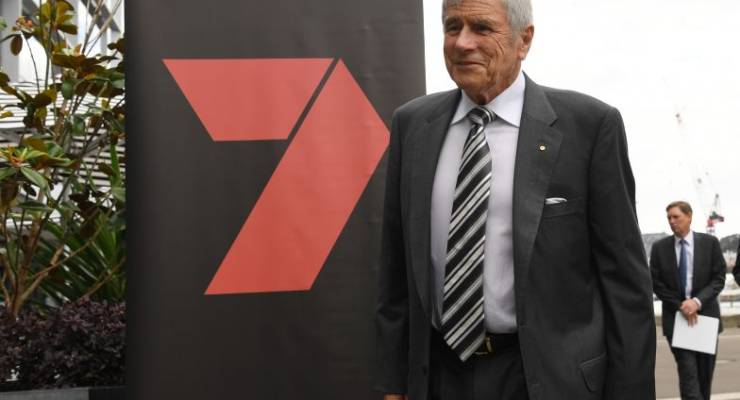
The 2020 free-to-air TV ratings battle is two weeks old and already the struggling Seven Network, owned by Seven West Media, is facing a hiding. It’s being beaten by its rival Nine and even Ten, which was three years ago in the hands of administrators.
This week Seven West Media will report its interim results for the 2019-20 financial year and, judging by the record lows for the company’s share price so far in 2020, it is going to be ugly.
Seven shares hit a new record low of 22.7 cents last week and have been trading around the 25 cent level for much of the past month. With more than half a billion dollars in debt (as of June 30), just $103 million in equity and sinking revenues and profits, Seven’s current market value of $384 million is not enough to cover its debt (although that figure will be reduced in Tuesday’s report).
Almost $4 billion in write downs in the past nine years has destroyed value that has in turn destroyed the once dominant hold Seven had on the Australian TV market.
In fact, at this level, investors are saying it is highly doubtful that the network and the company will be around at the finish of ratings in early December in its present form.
The only thing that can prevent that would be a recapitalisation by Kerry Stokes (the main shareholder through his company, Seven Group Holdings) and/or others aimed at slashing the company’s debt by injecting more equity.
To get enough equity to convince the market would require a near doubling in the number of shares on issue and a huge dilution of the holdings of existing shareholders, led by Stokes. There’s no prospect of a dividend after none were paid in 2018-19. Debts were extended until 2021, but that’s now not that far away.
Seven West Media’s share price has fallen 23% from the start of 2020 (the ASX 200 is up more than 6% despite the bushfires and China’s coronavirus crisis) and is down more than 50% since the start of last year.
In August last year Kerry Stokes appointed James Warburton as CEO (taking over from Tim Worner). On November 11, the shares peaked at 48 cents as Warburton moved to sell the underperforming Pacific magazines business and merge with NSW regional affiliate Prime Media. But both deals haven’t happened and the share price has almost halved.
The fall in Seven West’s share price has seriously undermined Kerry Stokes’ prestige and standing in the media sector. “Little Kerry”, as some call him, is now a much less powerful figure — even in Perth where The West Australian continues to sink into the sunset led by falling revenues and earnings and continuing staff cuts.
Another loser will be fund manager Spheria. It’s looking at big losses on its recently built stake of nearly 96 million Seven West shares. Late last year Spheria sold its 14.9% stake in Prime to Seven in exchange for 30 million Seven West shares. But, in a notice to the ASX on December 20, Spheria said it had built that stake to 95.8 million Seven West shares (6.2% of the company). This made it the second biggest shareholder after Stokes and his Seven Group Holdings.
Regional TV owner (WIN) Bruce Gordon is another on the list of potential losers if Seven falls. He was a big loser in the collapse of Ten and is now suffering from the slide in the price of Prime Media shares. That’s the company Seven tried to take over late last year but was blocked by Gordon and Antony Catalano, and his Melbourne billionaire mate Alex Waislitz.
Catalano bought the regional newspapers of Fairfax from Nine for $115 million and then plunged into Prime to frustrate Seven’s merger. He was successful, but has now been left (with Gordon) holding shares no one but Seven wants. Most of these Prime shares were bought around 21 cents. They recently hit 16 cents — an all-time low.








As a shareholder in Seven Media, I take an almost masochistic pleasure in Kerry Stokes’ problems (my shareholding is worth so little compared to their value when they were just the West Australian there’s little pain if the share price falls further).
I voted against Kerry Stokes taking over the company. I voted against the merger with Channel Seven. Since Kerry Stokes gained control, the West Australian has deteriorated badly. It’s not worth lining the bottom of bird cages, let alone reading.
The sooner Turnbulls co assassinator sinks into the slime he and his mate Murdoch come from the better for the media and Australia and its to be hoped they take the shock jocks and their media hacks with them.
Under no circumstances must Murdoch be able or enabled to buy Seven or any other free to air network.